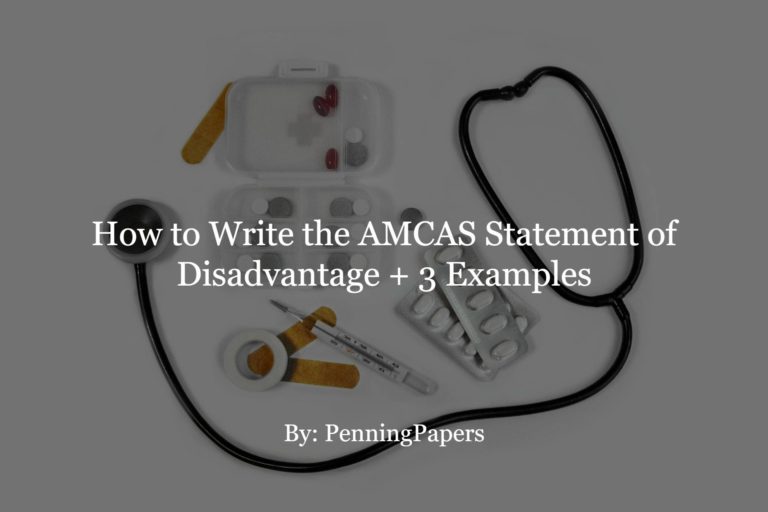In this article, we’ll be covering some proper AMCAS Statements of Disadvantage examples that helped our clients get accepted into medical school.
You’ll also learn how to write a solid AMCAS Statement of Disadvantage for yourself with our step-by-step guide.
Note that these rules are not absolute.
There are students who stray from conventional wisdom and write outside the bounds of what is normally expected. And, they can (sometimes) still get accepted.
But, if you want to maximize your chances of success at getting into medical school, we highly recommend following our tutorial and using our example AMCAS disadvantage statement for inspiration.
And, hey: don’t worry!
It’s not as difficult as you think. It just requires a bit of patience, some elbow grease, and strong articulation skills!
Let’s get started!
Table of Contents
- AMCAS Statement of Disadvantage Prompt + Considerations.
- How to Write the AMCAS Statement of Disadvantage.
- Successful AMCAS Statement of Disadvantage Examples That Worked.
Professional College Application Help.
Contact us. We'll get to you within 24 hours.
AMCAS Statement of Disadvantage Prompt + Considerations.

To properly answer the AMCAS Statement of Disadvantage, you’ll need to understand what the prompt is asking of you.
Let’s take a closer look.
“Do you wish to be considered a disadvantaged applicant by any of your designated medical schools that may consider such factors (social, economic or educational)?”
Character Limit: 1,325
American Medical College Application Service Official Website
Before you start writing, you’ll need to understand what the AMCAS considers a disadvantage. From the prompt above, we see that there are three.
- Social.
- Economic.
- Educational.
But, what do these 3 factors mean exactly?
The AMCAS provides us with some definitions which may be helpful.
“Underserved: Do you believe, based on your own experiences or the experiences of family and friends, that the area in which you grew up was adequately served by the available health care professionals? Were there enough physicians, nurses, hospitals, clinics, and other health care service providers?
Immediate Family: The Federal Government broadly defines ‘immediate family’ as ‘spouse, parent, child, sibling, mother or father-in-law, son or daughter-in-law, or sister or brother-in-law, including step and adoptive relationships.’
State and Federal Assistance Programs: These programs are specifically defined as ‘Means-Tested Programs’ under which the individual, family, or household income and assets must be below specified thresholds. The sponsoring agencies then provide cash and non-cash assistance to eligible individuals, families, or households. Such programs include welfare benefit programs (federal, state, and local) Aid to Families with Dependent Children (AFDC or ADC); unemployment compensation; General Assistance (GA); food stamps; Supplemental Security Income (SSI); Medicaid; housing assistance; or other federal, state, or local financial assistance programs.”
American Medical College Application Service Official Website
However, the AMCAS Statement of Disadvantage prompt is still vague. So, as a general rule, you should only answer if you believe your social, economic, or educational disadvantage was significant enough to negatively impact your application.
Remember to be specific about HOW your experience negatively impacts your application.
Here are some examples.
- You are applying to medical school as an international student and the class credit transferability became messy.
- Financial hardships made the cost of living stressful; and, this left no mental space to worry about your academic performance.
- You experienced discrimination due to very bad social dynamics (homosexuality, severe bullying, mental health crises, etc.) which took precious time away from productive studying or work.
- You had learning disabilities such as Dyslexia or ADHD which made maintaining grades more difficult than what others could do.
Of course, these examples aren’t the only topics you’re allowed to talk about in the AMCAS Statement of Disadvantage. You can talk about any topic (so long as it sufficiently shows how you could not perform at the level others could)
How to Write the AMCAS Statement of Disadvantage.

There are 5 primary points you should consider when the AMCAS Statement of Disadvantage. There’s honesty, digging deep into everything you can talk about, being precise with facts, connecting your experience to disadvantages, and being sure to conclude on a positive note.
These general rules don’t just apply to the AMCAS disadvantage statement. It also applies to any application essay or form where you need to elaborate on unusual circumstances.
Below, we’ll be breaking down each of these ideas one at a time.
The Importance of Being Honest.

You MUST be honest.
Period. Full stop.
Many students writing the AMCAS Statement of Disadvantage will wonder whether they should lie. Some will actually lie. Others may tell the truth but with white lies sprinkled in.
We can assure you: lies in medical school won’t get you anywhere.
The AMCAS Statement of Disadvantage is an opportunity for the admissions office to provide you with a holistic admissions process. This means they try to consider the whole applicant, which also involves elements outside of academic performance like experience, personal character, and how you handle disadvantages.
Thus, the AMCAS Statement of Disadvantage is a crucial tool for admissions officers to fairly judge students. By telling lies, you’ll be compromising the trust of your admissions officers.
And, in your medical school applications, trust is worth its weight in gold.
Seriously. Admissions officers will be on their toes for lies; so, if you so much as wave a flicker of untruth, you’re unlikely going to earn back that trust.
Admissions officers know students are going to try to find every opportunity possible for an unfair advantage; so, know that by lying you are compromising your chances of success by putting yourself in their crosshairs.
Yikes.
Now, this brings up another question.
“Wouldn’t filling out the AMCAS Statement of Disadvantage as honestly as possible make your disadvantages seem less valid? What if your minor educational struggles don’t seem as strong as someone lying about their financial struggles?”
And, well, that’s a good point!
This is where we get to our next point: your honest answer is probably (almost certainly from our experience working with clients) much stronger than you think.
There’s Probably A Lot More to Talk About Than You Think.

Maybe you feel that you don’t have much to write about.
Perhaps you don’t feel your AMCAS Statement of Disadvantage is valid because other people are lying about being in a financial disaster and having learning disabilities, while you only had some stress in school.
Well, from our years here at PenningPapers working with countless students on their medical school applications, we can confidently say that you’re likely to have stronger content than you think.
Most students only talk about their disadvantages on a surface level. They don’t really talk about ALL of the elements of their disadvantages that would help make their case stronger.
In fact, here’s a general rule for finding content to write about in the AMCAS Statement of Disadvantage: if you have one disadvantage to talk about, there are multiple other details connected to that disadvantage that can be clarified.
Here’s an example.
Let’s say you write your AMCAS Statement of Disadvantage about having a learning disability.
It may not just be that you had a learning disability. Rather, you may also have had a hard time making friends, finding the right resources, and finding acceptance for your condition due to the stigma from your family’s culture.
This actually has a massive impact on your ability to perform in academics. And, the other extraneous details are perhaps more crucial to the whole story than you may expect. They help paint a better picture for admissions officers to empathize with your struggles.
Be Precise With The Facts.

This one should be a given. But, it’s still important to talk about nonetheless
You need to be very precise and accurate with your facts.
This means that you need to make sure admissions officers don’t finish reading your AMCAS Statement of Disadvantage with more questions than answers. They should have a clearer idea of what made your circumstances difficult and, more importantly, how that makes you a solid candidate.
Perhaps one of the most common mistakes we see students make here is they would leave out crucial details that help admissions officers who are “outsiders” to their situation understand the gravity of the problem.
Here’s an example.
We once had a client write about how their disadvantage was in having a language barrier, as they were an international student applying for college in the States. Unfortunately, all they mentioned was that English was hard.
English can be hard for a lot of people. But, what they failed to mention was that the resources available on their campus were very limited in forming proper English abilities. The only available resources were paid English tutoring sessions, which were often much more expensive and inaccessible for the average international student.
This makes their disadvantage more than just “English is hard.”
There’s an accessibility problem as well as a financial problem tied to English ability.
Consider your own circumstances, and think about how there may be multiple elements to your disadvantages. Are you really telling the full story? Chances are, there are going to be more details and facts you need to be VERY precise with to help admissions officers see the full story.
Remember: they deserve the full story, just as you deserve a comprehensive and fair college review process! It’s the admissions office’s job to understand you best, so help them by sharing the nitty-gritty details (so long as they’re relevant.)
Remember: WHY Did Your Circumstances Lead to a Disadvantage?

This one is a classic rule: You need to connect what you write to WHY you were disadvantaged.
Think of the classic AP Lit joke.
What does the AP in AP Lit stand for? It stands for “Answer the Prompt!”
*Ba Dum, Tss!*
Okay, jokes aside, that’s the essence of this section’s rule. You need to make sure you’re actually answering the AMCAS Statement of Disadvantage prompt. Connect all your experiences together and show how they prove that you’re at a disadvantage.
Let’s say you had some social disadvantages, such as living in a conservatively religious community as someone who was not religious. You may have had a lot of experiences as an atheist that stagnated your progress in being a strong candidate for admission.
So, you do what every sensible student would do and provide background information on your disadvantages.
That’s all fine and dandy. But, don’t forget to explain to admissions officers WHY you were disadvantaged. WHY do your experiences make you a disadvantaged student and how did the experiences correlate to that?
When you demonstrate this to admissions officers step-by-step, they’ll have an easier time processing and assessing your content. Ultimately, it helps them do their job better. And, they don’t have to shoot around in the job just to figure out what you’re trying to say.
End Positively.

Ending on a positive note is often the conventional advice given to students filling out all medical school application essays.
However, when you’re writing your AMCAS Statement of Disadvantage, it’s especially important that you end on a positive note. Don’t conclude with a pessimistic tone.
Ending your AMCAS Statement of Disadvantage positively helps assure admissions officers that, despite your challenges and obstacles, you’re still prepared to succeed at the school you’re applying for.
That is, ending positively is a form of insurance.
When admissions officers read about disadvantages, they ultimately need to decide whether the student is still fit to attend.
So, if a student has still not recovered from traumatic experiences that may impact other fellow students, they may be rejected.
Demonstrate to admissions officers that you can still succeed in a university setting despite the disadvantages you struggled through. If you’re creative, you can even write about how your disadvantages even make you a stronger applicant.
Successful AMCAS Statement of Disadvantage Examples That Worked.

In this section, we’ll cover 3 successful AMCAS Statement of Disadvantage examples that worked. The students who wrote these statements received help from our professional medical school application writing services.
Because the Disadvantage Statement is rather short compared to other elements of the application, students who only need help with writing the essay often only need 2 hours of professional essay help (which includes brainstorming, editing, and revisions.)
Note that the AMCAS Statement of Disadvantage examples listed below are written by students with their own unique experiences and personal qualities. What might work for one student is no guarantee of success for another.
AMCAS Statement of Disadvantage Example 1: Social

“My family and I immigrated to the States just 6 years ago.
Although I was familiarized with English speaking, writing, and reading to some degree, my “book knowledge” wasn’t quite as sophisticated as the casual in-person speaking making up real-world English. I could follow classes well; but, I didn’t have the social finesse required to capitalize off of opportunities.
Such opportunities involved reaching out for research, leading club projects, and utilizing campus services. Because my English was limited, I lacked the confidence to reach out to perfectly good opportunities. I missed out on the chance to conduct research with fellow professors whose work I enjoyed, and I decided against starting clubs that would have made my undergraduate experience much more colorful.
Fortunately, I managed to fight off my anxiety and acclimate myself to a full English-speaking community. The culture, mannerisms, and other “-isms” took some getting used to; but, I find I’m much more excited for new opportunities this time. So, despite being recently integrated into the States, and the overwhelming anxiety to pursue opportunities its caused, I’ve managed to step out of my comfort zone and take chances when I can. I hope to implement this newfound courage into my future challenges in med school.”
AMCAS Statement of Disadvantage Example 1: Social
AMCAS Statement of Disadvantage Example 2: Economic

“In full transparency, my family and I were not always the best with finances.
I include myself in the equation as well because, while my parents primarily decided to shoulder the financial responsibilities of our family, I was no stranger to poor financial choices. We both learned to become a bit too irresponsible with credit card debt. And, this could have been a result of a lack of financial education.
Nonetheless, this lack of financial responsibility wasn’t too much of a problem until my father lost his job due to massive layoffs at his company. Suddenly, being neck-deep in debt became infinitely more terrifying. Not only that, but the financial burden of being in high-interest credit card debt funneled me into taking whatsoever jobs I could get my hands on. I still remember finishing late-night shifts and wondering to myself just how many chances at research opportunities, study sessions, and even social get-togethers I was missing.
Yet, at the same time, I feel quite grateful for this disadvantage.
I feel that this time was the first taste of adulthood I ever had. Despite losing many educational and social opportunities, I learned how to become a much more independent student capable of fixing their own problems; and, I hope to translate that into medical school.”
AMCAS Statement of Disadvantage Example 2: Economic
AMCAS Statement of Disadvantage Example 3: Educational

“I have ADHD.
Although there are many misconceptions about the condition, I understand it as an executive function impairment. And, it was this impairment that I’ve wrestled with for just about my whole academic experience. However, I was unaware of my condition until my diagnosis mid-Junior year of university. I didn’t overthink of it, especially since my family inherited much of their anti-mental health doctrine from their hometown in South Korea. We were raised to believe learning conditions didn’t exist. And, inexorably, I was raised in the same manner.
However, it was when my school counselor provided my advice on getting tested for ADHD and when my therapist provided me with free resources on how to achieve success with my condition that I noticed a dramatic change.
Unlike high school and early college, the new strategies I implemented to accommodate a lacking executive function —such as reducing friction and alternating between tasks swiftly— have dramatically turned my performance 180 degrees. I could perform better than ever before with a fraction of the effort —even with more rigorous content.
Unfortunately, I wish I were diagnosed sooner. Nonetheless, much to my conservative family’s surprise, my newfound acceptance of ADHD encourages me to tackle medical school with excitement and daring.”
AMCAS Statement of Disadvantage Example 3: Educational
If you’re still unsure of how to approach the AMCAS Statement of Disadvantage, you may want to consider speaking with a professional medical school admissions consultant. Here at PenningPapers, we can help with exactly that. Schedule a free consultation with us, and we’ll help you write a stellar AMCAS Statement of Disadvantage that helps admissions officers see the real you (and get you accepted, of course!)

